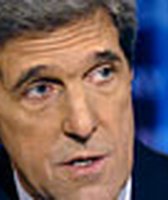Stand up for the facts!
Our only agenda is to publish the truth so you can be an informed participant in democracy.
We need your help.
I would like to contribute
Paul Ryan says the Obama administration ‘watered down sanctions’ against Iran
President Barack Obama’s administration "has no credibility" to challenge Iran’s nuclear aspirations, Rep. Paul Ryan argued in his debate with vice presidential rival Joe Biden.
The pair outlined a sharp difference in approach to Iran as they sat side by side in Danville, Ky., on Oct. 11, 2012.
The Wisconsin Republican, answering a question from moderator Martha Raddatz about using a military strike to prevent Iran from getting a nuclear weapon, argued:
"In order to solve this peacefully -- which is everybody's goal -- you have to have the ayatollahs change their minds. Look at where they are. They're moving faster toward a nuclear weapon. It's because this administration has no credibility on this issue. It's because this administration watered down sanctions, delayed sanctions, tried to stop us from putting the tough sanctions in place. Now we have them in place because of Congress."
We can’t read the ayatollahs’ minds, but we checked whether the Obama administration "watered down sanctions, delayed sanctions, tried to stop (Congress) from putting the tough sanctions in place."
We found Ryan was oversimplifying a difference of opinion between Congress and the White House not over whether to pressure Iran — but the most effective way to go about it.
Sanctions against Iran
First, a little background. Iran has faced U.S. sanctions since its 1979 Islamic revolution. The United Nations and other nations have joined in sanctions since 2006 in response to Iran’s efforts to develop a nuclear weapon, according to the Congressional Research Service, which provides nonpartisan analysis to Congress. The Obama administration’s policy has been to combine sanctions with negotiations, seeking "additional U.S., U.N., and allied country sanctions whose cumulative effect could compel Iran to accept a nuclear bargain."
The country now has the "most sweeping sanctions on Iran of virtually any country in the world," according to a February 2012 Congressional Research Service report. Last month’s report calls them "what many now consider to be ‘crippling’ sanctions."
So, what’s Ryan’s argument? The Romney-Ryan campaign pointed us to news coverage of an Obama administration compromise in 2010 to earn China and Russia’s backing for new sanctions through the United Nations.
The U.N. Security Council in 2010 voted to sanction Iran but didn’t include among those sanctions measures against the nation’s Central Bank because of opposition from the two nations, which have veto power on the council.
The Obama administration instead said it would also push forward with tougher sanctions on its own. And indeed, Obama has signed into law several rounds of legislation and executive orders strengthening the U.S. position.
(For a detailed look at U.S. sanctions against Iran, the Congressional Research Service regularly updates its report with new legislation and enforcement actions.)
Ryan: Credit Congress, not Obama
The Romney-Ryan campaign argues that Congress deserves credit for much of that, such as legislation targeting the Central Bank. A spokesman for Romney told PolitiFact in February that tougher sanctions imposed by the United States earlier this year "weren’t done by Obama," but through an amendment to the National Defense Authorization Act that Obama opposed, tried to water down, and won exceptions for.
"In implementing them, he was only doing what he was required to by an act of Congress," Romney spokesman Ryan Williams told us.
Meanwhile, Obama wrote a signing statement saying that the sanction’s requirements were nonbinding, Williams noted. (Obama wrote that the Iran sanctions section "would interfere with my constitutional authority to conduct foreign relations by directing the Executive to take certain positions in negotiations or discussions with foreign governments. Like section 1244, should any application of these provisions conflict with my constitutional authorities, I will treat the provisions as non-binding.")
Obama also undermined the sanctions’ requirement for countries seeking exceptions to "significantly reduce" their Iranian crude oil purchases by leaving the definition of "significant" to the discretion of the secretary of state, Williams said. (Sens. Robert Menendez, D-N.J., and Mark Kirk, R-Ill., authors of the amendment, argued it should mean at least 18 percent.)
The president issued exceptions to 20 of the top oil exporters from Iran, including China, the Romney-Ryan team said, citing a June 2012 New York Times article.
For its part, meanwhile, the Obama administration argued that the amendment, which passed despite the administration's objections, could "alienate foreign countries, make it more difficult to pressure Iran and raise oil prices, which could actually help the Iranian economy," according to Foreign Policy’s The Cable.
Experts: A push for flexibility, not weakness
After decades of U.S. sanctions, there’s little left to ban between the United States and Iran, so new rules necessarily target other countries. But move too fast, and the United States risks losing the cooperation of nations it needs as allies in the wider push to isolate Iran, experts told us.
Congress wants a crackdown; the executive branch wants diplomacy.
Iran policy experts told us that while the Obama administration pushed back against Congress — including what you might call watering down and delaying enforcement of legislative initiatives — that doesn’t mean the administration wasn’t tough on Iran.
Michael Levi of the Council on Foreign Relations, an independent, nonpartisan think-tank, told PolitiFact earlier this year that’s not evidence the Obama administration had a weak stance on Iran, it's just that Obama resisted letting Congress dictate the terms.
"Flexibility is the watchword," he said. "It's really hard to argue that this administration hasn't brought strong pressure to bear on Iran."
Leonard Spector of the Monterey Institute of International Studies at Middlebury College told us in February that the administration has been a driving force internationally to put pressure on Iran, even if it failed to get the U.N. to target Iran’s Central Bank.
"Obama, unilaterally and in concert with the (European Union) and other allies, has gone much further," he said.
Avner Cohen, a senior fellow at the Monterey Institute of International Studies and a Democrat, has told us it's legitimate to raise questions about whether the administration should have acted sooner to impose its own tougher sanctions. But he said it's more valuable to get other nations to join the effort.
"To make something effective in the real world, it needs to pass the Security Council," he said.
It’s true, he said, that the the administration "had to water down some of the language to pass it." But Ryan’s claim is "totally out of context," he concluded.
James Jeffrey, a deputy national security adviser in the Bush administration and ambassador to Iraq and Turkey under Obama, said this kind of back-and-forth between Congress and the executive branch happens all the time. Congress wants to exert unilateral pressure, and the executive needs room for diplomacy with its allies.
You could just as easily characterize what Ryan calls watering down as the Obama team "strengthening the ability to enforce" sanctions against Iran, he said.
In fact, the United States and European Union, among others, are now putting so much economic pressure on the country that "many judge that Iran might soon decide it needs a nuclear compromise to produce an easing of sanctions," according to the Congressional Research Service’s September report.
Our ruling
Ryan argued that "this administration watered down sanctions, delayed sanctions, tried to stop (Congress) from putting the tough sanctions in place." He’s right that the Obama administration compromised with Russia and China to earn their backing in the U.N. Security Council, and pushed for legislative waivers and other flexibility from Congress as it organized an international coalition to counter Iran.
But just because the administration resisted plans in Congress does not mean it failed to get tough sanctions imposed. In fact, that international diplomacy has resulted in "what many now consider to be ‘crippling’ sanctions." In fact, there’s now so much economic pressure on Iran that Congress’ research arm reports Iran may soon decide to seek a nuclear compromise.
That’s the opposite of what Ryan’s critique suggests. He employs a sliver of truth in service of a misleading impression. We rate his claim Mostly False.
Our Sources
CQ Newsmaker Transcripts, "Vice President Biden and Republican Vice Presidential Nominee Paul D. Ryan Participate in the Vice Presidential Candidates Debate at Centre College in Danville, Kentucky," Oct. 11, 2012 (subscription only)
C-SPAN Video Library, "How Effective Would Military Action Be Against Iran?" Oct. 11, 2012
PolitiFact, "Mitt Romney says Barack Obama 'could have gotten crippling sanctions against Iran. He did not,'" Feb. 23, 2012
Email interview with Robert Terra, Romney-Ryan campaign, Oct. 12, 2012
Email interview with Ryan Williams, Romney-Ryan campaign, Feb. 23, 2012
Email interview with Kara Carscaden, Obama-Biden campaign, Oct. 12, 2012
Interview with James Jeffrey, visiting fellow at the Washington Institute for Near East Policy, Oct. 12, 2012
Interview with Avner Cohen, professor and senior fellow, Monterey Institute of International Studies, Oct. 12, 2012
Email interview with Avner Cohen, professor and senior fellow, Monterey Institute of international Studies, Middlebury College, Feb. 23, 2012
Interview with Michael Levi, senior fellow for energy and the environment and director of the program on energy security and climate change, Council on Foreign Relations, Feb. 23, 2012
Email interview with Leonard S. Spector, executive director, Washington, D.C., office, James Martin Center for Nonproliferation Studies, Monterey Institute of International Studies, Middlebury College, Feb. 23, 2012
White House, "Remarks by the President on United Nations Security Council Resolution on Iran Sanctions," June 9, 2010
New York Times, "U.N. Approves New Sanctions to Deter Iran," June 9, 2010
New York Times, "Sanctions Effort May Open Door to Press Iran Central Bank," May 19. 2010
Foreign Policy's The Cable Blog, "Menendez Livid At Obama Team’s Push To Shelve Iran Sanctions Amendment," Dec. 1, 2011
Department of the Treasury, Letter From Treasury Secretary Geithner to Senate Committee on Armed Services, Dec. 1, 2011
New York Times, "U.S. Bets New Oil Sanctions Will Change Iran’s Tune," June 30, 2012
New York Times, "Oil Backed Up, Iranians Put It on Idled Ships," July 4, 2012
Wall Street Journal's Corruption Currents, "Obama Signs New Iran Sanctions into Law," Aug. 13, 2012
U.S. Department of the Treasury, "U.S. Sanctions on Iran," accessed Oct. 12, 2012
Congressional Research Service, "Iran Sanctions," Sept. 13, 2012 (We previously accessed the Feb. 10, 2012, version of this report at the same URL.)
Treasury Department, Office of Foreign Assets Control, "What You Need to Know About U.S. Economic Sanctions," accessed Sept. 24, 2012
Browse the Truth-O-Meter
More by Becky Bowers
Paul Ryan says the Obama administration ‘watered down sanctions’ against Iran
Support independent fact-checking.
Become a member!
In a world of wild talk and fake news, help us stand up for the facts.






















































